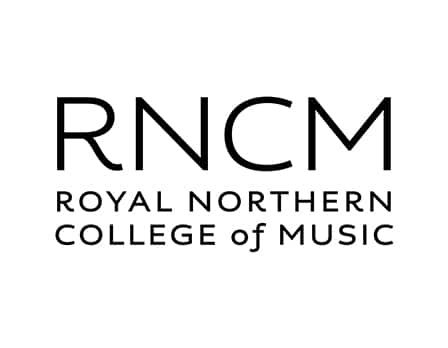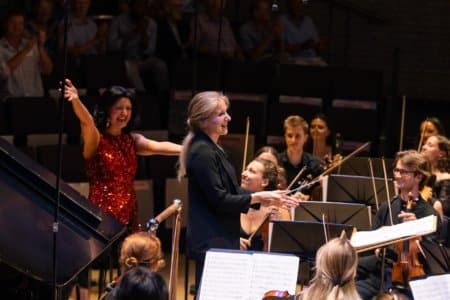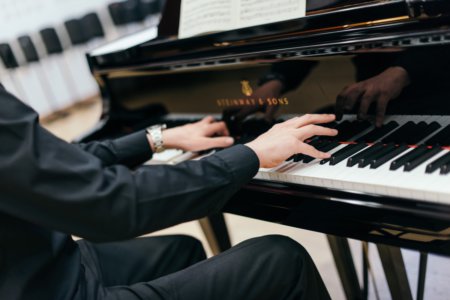“The best place to begin is away from the instrument. Great interpretations are born in the mind, not in the hands.” – Chris Hoyle, Head of Strings, Royal Northern College of Music
From auditions to community theatre and creative presentations, performing often boggles the brain and always wracks the nerves. Even the most confident artist or musician can feel overwhelmed; swept up in a tangled sea of pressure, passion and technique that prevents their very best. But fear not, young creatives, for the experts have named preparation as the key to top results. As the late, great Benjamin Franklin once famously said: By failing to prepare, you are preparing to fail.
Start from the very beginning: it’s about creating something your audience wants to see or hear. The best way to stand out is to break through set conventions; to scan the hidden depths of your left creative brain to find something truly original. For the anxious instrumentalist, this can seem easier said than done, but as Chris Hoyle, Head of Strings at the Royal Northern College of Music (RNCM) explains, great interpretations are conceived in the mind and not the tools in your hand.
“The best place to begin is away from the instrument,” he adds. “Take time to ‘feed’ yourself artistically from as many valuable sources as you can. Attend a variety of teaching events, listening to instruction on instruments other than your own. Go to lots of concerts to hear ‘everyone who’s anyone’. Listen to the symphonic works and the operas of the masters. How much more valid will your interpretation of the Brahms violin concerto be if you know his orchestral works, his songs and have played his chamber music?”

But don’t stunt your creative flow in the quest to be original. Plagiarism is wrong, and it’s a completely different game from artistic inspiration. A creative with no desire to stir, empower or enlighten is one that lacks real heart. Your musical journey began with a lyric, rhythm or spine-tingling melody that provoked a rich emotion, and that’s a creative muse you won’t ever forget. It’s important to remember what first unleashed your talent and passion, balancing all that has influenced you with your own unique power to influence.
“It’s important to have a good musical ‘blueprint’,” says Hoyle. “This goes much deeper than just copying other artists, great though they may be. I offer my own students more than one interpretive idea and I encourage them to find their own version, based on certain principles, one of which is trying to find the soul of the composer inside each piece. I draw my creative inspiration from two sources: the beauty of nature and important examples of architecture.”
For your performance to be top-notch, your material must be class, and that means giving yourself plenty of time to let your creative flair take flight. If you are a training or studying musician, it’s important you take every performance opportunity you can get. That’s why students at the RNCM are presented with a wealth of performance and development options, both in and outside of college. Here, study has been specifically designed to enhance professional skill and employability to the highest degree.

“The key word is ‘balance’,” Hoyle explains. “As musicians we need to adopt so many varied roles: scientists, detectives, mathematicians, painters, poets, thinkers, dancers, philosophers, actors. It’s important to embrace both discipline and imagination.”
So, you’ve nailed the first step and created something compelling. But as the performance date looms closer, you need to keep things under control. While some appear immune to the crowd’s penetrating gaze, some of history’s greatest soloists have been known to buckle under the heat – including singer Maria Callas and classical pianist/composer Vladimir Horowitz. The good news is, science has shown that anxiety doesn’t always impair performance, and can in fact, enhance it.
A 2017 study published in the Journal of Individual Differences examined individual appraisals of certain situations. Researchers found that those who viewed stressful events as challenges rather than threats gained energy from their nerves, which, in turn, motivated them and improved performance. It might surprise you to know artists perform best when they acknowledge their anxiety, rather than suppress it.
“As a performer, one may be slightly nervous, excited and have more adrenaline coursing through the system,” says Lynne Dawson, Head of Vocal Studies and Opera at the RNCM “this is good – it means you may react more quickly and may have more energy. Performing is as much about reacting as it is acting.

“Make sure you know the music and have prepared thoroughly,” Dawson explains. “And don’t agree to perform any repertoire you can only perform on a good day with the wind behind you without knowing exactly how you do it!”
Dawson notes the importance of having an expectation of what works. Arrive well-prepared, have a good relationship with your colleagues, absolutely be part of the ensemble or orchestra; we prepare and rehearse well so that we are free to fly during the performance.
“Do a lot of homework, make sure you know the piece from memory,” Dawson concludes. “If one is touring, try to work out the best way to practice. Know the music as well as you possibly can. Do your job. It’s a huge privilege to be a performer; share the joy and be generous. Make it count and always mean the words.”
Follow the Royal Northern College of Music on Facebook, Twitter, YouTube, Instagram and LinkedIn
Liked this? Then you’ll love these…
Studying at the Royal Northern College of Music
Royal Northern College of Music: Join the buzz of Manchester’s music scene













